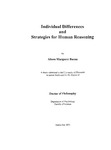Individual differences and strategies for human reasoning
| dc.contributor.supervisor | Handley, Simon | |
| dc.contributor.author | Bacon, Alison Margaret | |
| dc.contributor.other | Faculty of Science and Engineering | en_US |
| dc.date.accessioned | 2011-05-10T14:29:48Z | |
| dc.date.available | 2011-05-10T14:29:48Z | |
| dc.date.issued | 2003 | |
| dc.identifier | Not available | en_US |
| dc.identifier.uri | http://hdl.handle.net/10026.1/349 | |
| dc.description.abstract |
Theories of human reasoning have tended to assume cognitive universality, i. e. that all individuals reason in basically the same way. However, some research (e. g. that of Ford. 1995) has found evidence of individual differences in the strategies people use for syllogistic reasoning. This thesis presents a series of experiments which aimed to identify individual differences in strategies for human reasoning and investigate their nature and aetiology. Experiment 1 successfully replicated and extended Ford (1995) and provided further evidence that most individuals prefer to reason with either verbal-propositional or visuo-spatial representations. Data from verbal and written protocols showed that verbal reasoners tended to use a method of substitution whereby they obtain a value for the common term from one premise and then simply substitute it in the other premise to obtain a conclusion. Spatial reasoners, on the other hand, presented protocols which resembled Euler circles and described the syllogistic premises in terms of sets and subsets. Experiment 2 provided some further qualitative evidence about the nature of such strategies, especially the verbal reasoners, showing that within strategy variations occurred. Experiment 3 extended this line of research, identifying a strong association between verbal and spatial strategies for syllogistic reasoning and abstract and concrete strategies for transitive inference (the latter having originally been identified by Egan and Grimes- Farrow, 1982). Experiments 1-3 also showed that inter-strategic differences in accuracy are generally not observed, hence, reasoners present an outward appearance of ubiquity despite underlying differences in reasoning processes. Experiments 5 and 6 investigated individual differences in cognitive factors which may underpin strategy preference. Whilst no apparent effects of verbal and spatial ability or cognitive style were found, reasoners did appear to draw differentially on the verbal and spatial components of working memory. Confirmatory factor analysis showed that whilst verbal reasoners draw primarily on the verbal memory resource, spatial reasoners draw both on this and on spatial resource. Overall, these findings have important implications for theories of human reasoning, which need to take into account possible individual differences in strategies if they are to present a truly comprehensive account of how people reason. | en_US |
| dc.description.sponsorship | Economic and Social Research Council | en_US |
| dc.language.iso | en | en_US |
| dc.publisher | University of Plymouth | en_US |
| dc.title | Individual differences and strategies for human reasoning | en_US |
| dc.type | Thesis | |
| dc.identifier.doi | http://dx.doi.org/10.24382/4861 |
Files in this item
This item appears in the following Collection(s)
-
01 Research Theses Main Collection
Research Theses Main


